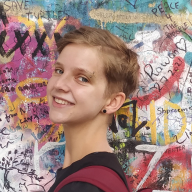
Weronika Zurek 🔸
Bio
Participation3
I first joined Effective Altruism when I started volunteering in Anima International in 2017 and I stayed in the organisation until 2023. For two years I was the coordinator of Anima International's polish capaign against live carp sales, which I later decided to close. Currently I am the main organiser of an EA university group at Jagiellonian University in Kraków, Poland.
When it comes to non-EA-related areas of my life, I am a student of applied psychology. l usually spend my free time doing arts (drawing, painting, crochet, embroidery and others). I also like all sorts of sports and I am a certified stretching instructor.
How others can help me
I am currently discovering impactful career paths and I would be happy to connect to professional animal welfare campaigners and EA community builders to learn more about these professions.
How I can help others
If you have any questions regarding fish farming in Poland or live carp sales, please do not hesitate to contact me - I will be happy to talk with you about these topics (#crazyfishgirl)
Posts 1
Comments5
I believe an important piece of information here is that Open Phil did not provide funding for organizers spending less than 10 h/week organizing their groups (or at least that was the case when I was applying for funding), so I suppose most of the funded students were probably working on the topic a bit more than that (this is a guess, though)
Hi Joris and Lin, thank you for your responses. Just as mentioned, it is quite interesting, for how many student receiving funding is the factor that decides about them setting up / taking over leading a group or not doing so.
Joris, I will be more than happy to share my thoughts with you in the future. Please do not hesitate to reach out to me at weronikamzurek@gmail.com or via slack anytime :) thank you for your work on that and I wish you all best in the process!
Thank you for the post and for clarifying the current situation.
I have mixed feelings about the results of the upcoming changes, particularly about stopping funding for part-time group organizers, as I feel this may lead to excluding many students from engaging in organizing groups. This particularly applies to:
- students with a difficult financial situation
- students who must cover high costs of living (e.g. due to living in an expensive city or region)
- students who must pay their university fees or pay back their student loan
I myself am a group organizer to whom none of the above applies, and still one of my main worries about setting up a university EA group was that I would have to start working at some point to cover my costs of living (combining studies, work and organizing a group does not seem possible). In fact, this scenario seemed more likely to happen than not. Thankfully, I received a grant from Open Philantropy to work on the group part-time and this was a game changer. This was the single most important thing that allowed me to set up the group and focus on it fully, which is critical, as I am the only organizer.
I am afraid that not providing funding may stop many students from setting up new groups, lower the capacity of current group organizers and even lead to some groups ceasing to exist. Furthermore, leading a group may essencially become an exclusive activity, available only to financially privileged students.
Having said that, I appreciate the transparency of both your, and Open Phil's post about the changes. Thank you for sharing that!

Thank you so much for sharing that, Guney. I will definitely use some of your ideas